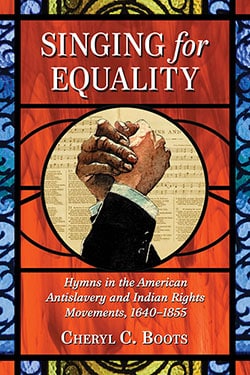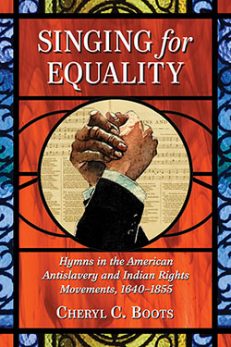Singing for Equality
Hymns in the American Antislavery and Indian Rights Movements, 1640–1855
$39.95
In stock
About the Book
Before the American Civil War, men and women who imagined a multiracial American society (social visionaries) included Protestant sacred music in their speeches and writings. Music affirmed the humanity and equality of Indians, whites and blacks and validated blacks and Indians as Americans. In contrast to dominant voices of white racial privilege, social visionaries criticized republican hypocrisy and Christian hypocrisy. Many social visionaries wrote hymns, transcending racial lines and creating a sense of equality among singers and their audience. Singing and reading Protestant sacred music encouraged community formation that led to American human rights activism in the 19th and 20th centuries.
About the Author(s)
Bibliographic Details
Cheryl C. Boots
Format: softcover (6 x 9)
Pages: 288
Bibliographic Info: 9 photos, appendix, notes, bibliography, index
Copyright Date: 2013
pISBN: 978-0-7864-7259-8
eISBN: 978-1-4766-0336-0
Imprint: McFarland
Table of Contents
Acknowledgments ix
Introduction: Recovering the Lost Soundtrack of American Social Visionaries 1
1. Seeing Children of God or Children of the Devil in Massachusetts Bay 11
2. Singing Nonconformist and Anglican Hymns in the 18th Century 26
3. Asserting Racial Equality with Sacred Verse in Early America 43
4. Debating Blacks’ and Indians’ Humanity in the Early Republic 66
5. Affirming the Humanity of Early-Antebellum Blacks and Indians 79
6. Making Space for Indians in Early Antebellum Fiction, or Not 103
7. Struggling to Enlist Support for the Cherokee People 132
8. Legitimating Black Emancipation with Blacks’ Voices 153
9. Singing Communities and the American Anti-Slavery Society 179
10. Making Space for Blacks in Late Antebellum American Fiction 203
Conclusion: Tracing the Legacy of Sacred Music and American Racial Equality 234
Appendix: Hymn Tunes Available Online 245
Chapter Notes 247
Bibliography 261
Index 266





